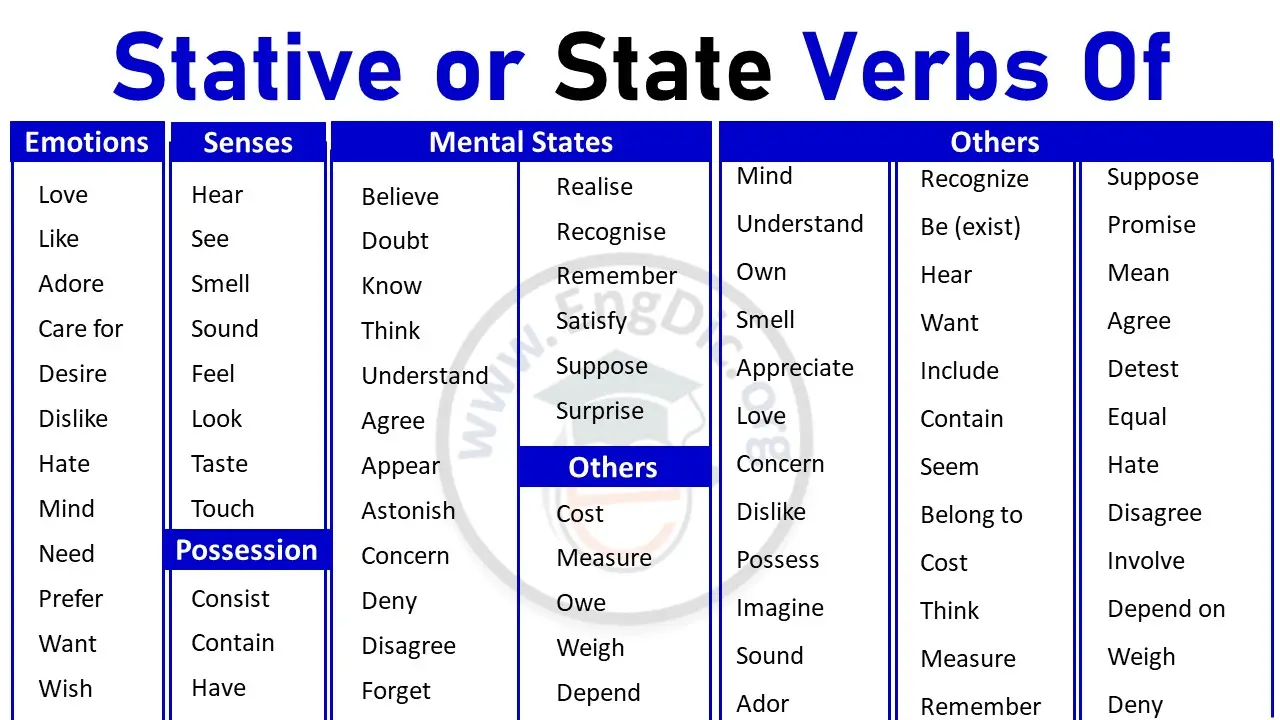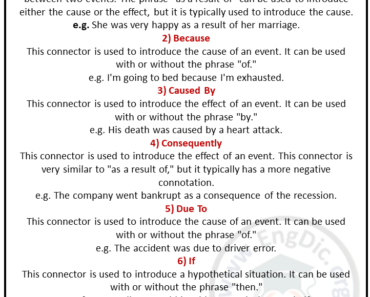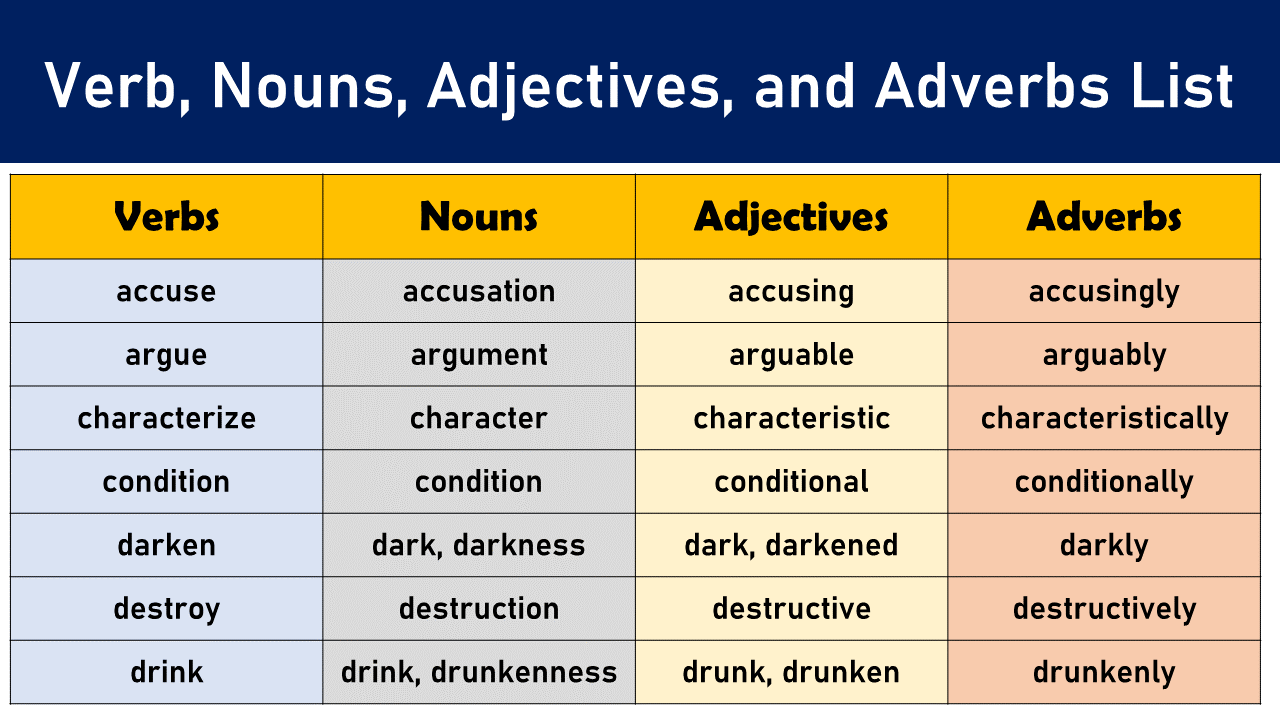Gerunds can be an integral part of any sentence structure. Whether you’re writing in formal or informal English, there is a good chance that knowing the basics of gerunds will come in handy at some point.
While the concept may seem daunting to many, it is not as difficult to comprehend as one might think.
In this blog post, we will provide a comprehensive overview of gerunds, their formation, their uses, list of gerunds and share examples of verbs followed by gerunds so you understand how they are used in sentences clearly and accurately!
What is Gerund?
A gerund is a verbal noun (Verb + ing), usually ending in “-ing,” that functions as a noun within the sentence.
Formation of Gerund
It is formed by taking the present participle (Verb + ing) of a verb (the form of the verb that ends in -ing) and using it as a noun. For example, the gerund form of “run” is “running.”
Examples of Gerund
“Reading is a great way to relax.” (subject)
“I enjoy swimming in the pool.” (Direct object)
“Her hobby is painting.” (compliment)
List of Some Common Gerunds
1- Cooking
2- Eating
3- Painting
4- Dancing
5- Swimming
6- Writing
7- Shopping
8- Jogging
9- Crying
10- Singing
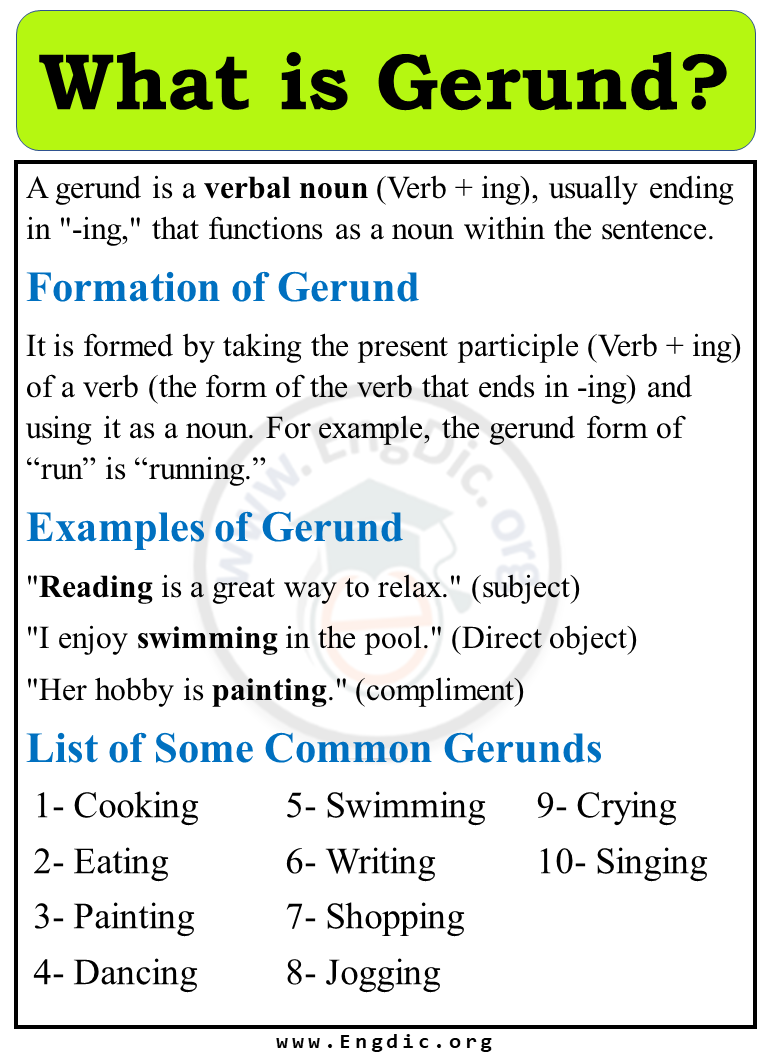
What are the functions and Uses of Gerunds?
Functions of Gerunds
Here are 5 Functions of Gerunds;
1- As Subject: Swimming is her favorite sport.
2- As Direct Object: She loves swimming in the pool.
3- As Modifier or Adjective: She bought a swimming suit.
4- After prepositions: She is interested in swimming.
5- After Certain Verbs: He enjoys swimming every day.
Uses of Gerunds
1- Gerunds can be used as the subject of a sentence.
2- They can also be used after certain verbs, like enjoy, stop, and finish.
3- Gerunds can also act as modifiers or adjectives.
4- Finally, they can be used after prepositions to create complex phrases.
By using gerunds, writers can easily switch between tenses and create more complex sentences. Gerunds are also helpful for describing activities in a precise way. They are versatile words that provide an opportunity for writers to express ideas more clearly.
Gerunds also help create interesting sentences by adding variety and texture to writing. For example, instead of simply saying “She likes to exercise” one could say “She enjoys running every morning” which provides more detail about the activity.

Types of Gerunds
There are four types of gerunds and gerund phrases;
- Subject
- Direct Object
- Object of Preposition
- Subject Complement
1- Subject:
This type of gerund is used as the subject of a verb. For example, “Voting is an important right.” In this sentence, ‘voting’ is the subject and it is a gerund.
Gerund As Subject Examples
1- Running is a great way to stay in shape.
2- Swimming is my favorite sport.
3- Singing can be therapeutic.
4- Studying can be difficult but rewarding.
5- Shopping can be fun.
2- Direct Object:
A gerund can also be used as a direct object for a verb. An example of this is “I enjoy cooking.” In this sentence, ‘cooking’ is the direct object and it is a gerund.
Gerund As Direct Object Examples
1- I love reading books.
2- He hates studying for tests.
3- She enjoys cooking meals.
4- We prefer swimming in the ocean.
5- They dislike running long distances.
3- Object of Preposition:
A gerund can also be used as the object of a preposition. An example of this is “We talked about going to the movies.” In this sentence, ‘going’ is the object of the preposition ‘about’ and it is a gerund.
Gerund As Object of Preposition Examples
1- She dreamed about traveling the world.
2- Ali decided against running for office.
3- They argued about studying abroad.
4- He thought about taking some classes.
5- They talked about going to the beach.
4- Subject Complement:
A gerund can also be used as a subject complement, which means it is used after a linking verb and describes the subject of the sentence. An example of this is “Her hobby is diving.” In this sentence, ‘swimming’ is the subject complement and it is a gerund.
Gerund As Subject Complement Examples
1- His favorite activity is playing basketball.
2- Our pastime is fishing.
3- His job was teaching English.
4- My goal is studying hard.
5- Our hobby is hiking.
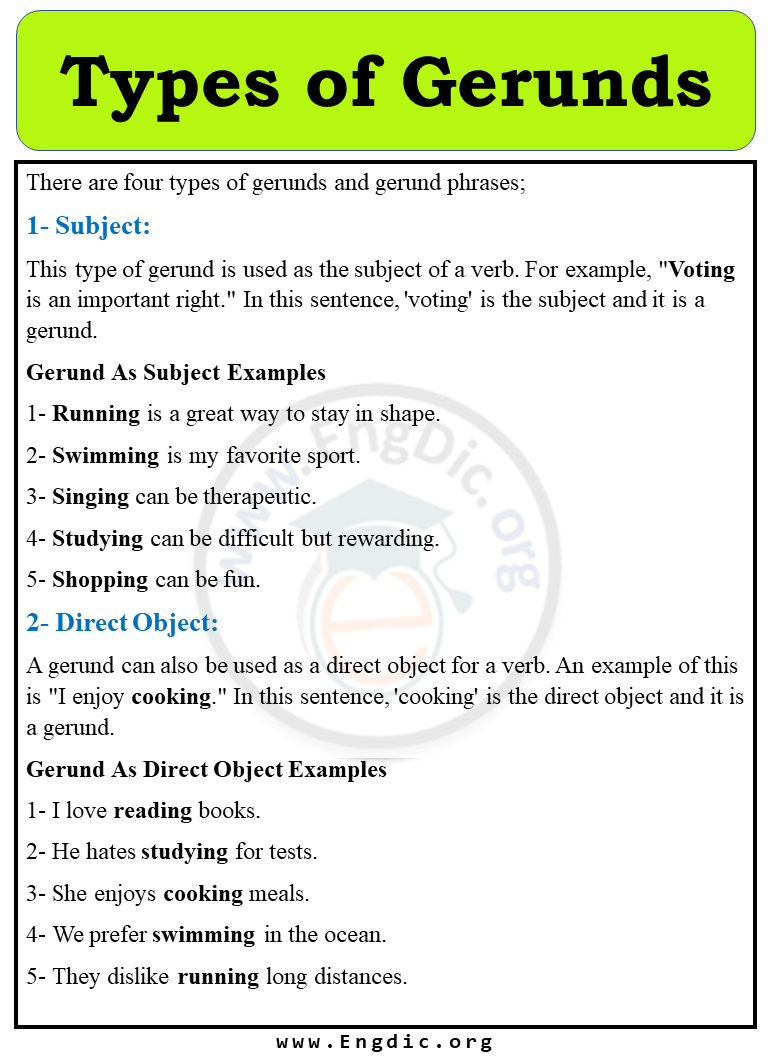
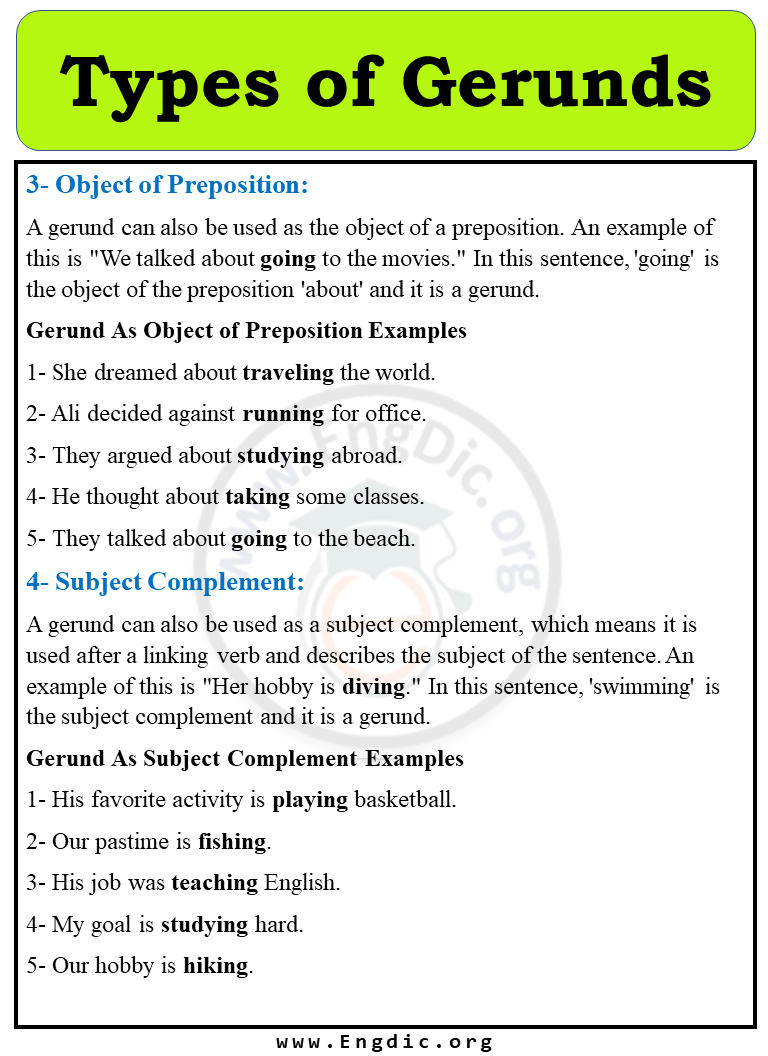
Verbs Followed by Gerunds
Verbs followed by gerunds are one of the confusing concepts. Generally speaking, gerunds are nouns created from verbs by adding “-ing”. While some verbs are almost always followed by a gerund (like enjoy or suggest), others should never be followed by one (like own or want). It’s important to pay attention to these nuances when constructing sentences because incorrect usage can unfortunately affect understanding and clarity.
List of Verbs Followed by Gerunds with Example Sentences
1- Accept: He accepted going to the party.
2- Admire: He admires working with boss.
3- Admit: She admitted stealing the money.
4- Adopt: They adopted using green energy in their home.
5- Agree: They agreed meeting up after work.
6- Aim: She aims finishing the project before the deadline.
7- Anticipate: They anticipate going on vacation soon.
8- Appear: He appears studying the map.
9- Appreciate: He appreciated having her assistance.
10- Argue: She is arguing talking to me like that.
11- Arrange: We arranged going on a camping trip next month.
12- Avoid: I’m avoiding eating junk food.
13- Begin: She began learning Spanish last year.
14- Consider: I’m considering taking a class on painting.
15- Continue: They continued studying until midnight.
16- Crave: She craves eating ice cream.
17- Decide: They decided going to the movies tonight.
18- Defend: He defended taking an extra day off work.
19- Delay: We had to delay going to the beach because of bad weather.
20- Demand: She demands having her own way.
21- Deny: She denied stealing the money.
22- Deserve: He deserves getting the promotion.
23- Desire: She desires having her own place.
24- Determine: He determined working late tonight.
25- Discuss: We discussed going to the beach this weekend.
26- Dislike: He dislikes running on the treadmill.
27- Dread: He dreads going to meetings.
28- Endure: She endured doing the same job for years.
29- Enjoy: She enjoys swimming in the lake every morning.
30- Expect: We expect visiting Eiffel Tower when we go to Paris.
31- Fail: He failed passing the exam.
32- Fear: I fear making a mistake.
33- Finish: Have you finished writing your essay?
34- Forget: Don’t forget taking your medication before bedtime.
35- Go: We should go shopping this afternoon.
36- Hate: I hate doing laundry.
37- Hesitate: She hesitated asking for help.
38- Hope: They hope finding a better job soon.
39- Ignore: Don’t ignore talking to him.
40- Imagine: I can’t imagine living without music.
41- Intend: He intends going to school next year.
42- Invite: We invited going camping this weekend.
43- Involve: This job involves working late nights.
44- Keep: You should keep trying until you find the right solution.
45- Like: She likes eating ice cream.
46- Love: He loves playing tennis on Sundays.
47- Mention: He mentioned visiting the museum next week.
48- Miss: I miss having my old friends around.
49- Need: She needs working hard to get into college.
50- Negotiate: They negotiated getting a better salary.
51- Obey: They obey following the rules and regulations.
52- Offer: He offered taking her out for dinner.
53- Persuade: He persuaded going on vacation with his family.
54- Plan: We plan on visiting Europe next summer.
55- Postpone: We had to postpone going camping because of rain.
56- Practice: I need to practice speaking Spanish more often.
57- Prefer: She prefers working in the morning.
58- Prevent: You should prevent making the same mistake again.
59- Propose: He proposed taking a break from work.
60- Provide: She provided hosting the party at her house.
61- Quit: Have you quit smoking yet?
62- Recommend: The doctor recommends exercising more often.
63- Reconsider: I’m reconsidering taking this job.
64- Refuse: He refused attending the meeting.
65- Regret: She regrets studying harder in school.
66- Request: He requested taking a day off work.
67- Resist: She resisted eating chocolate for a week.
68- Risk: He risks getting hurt if he tries that stunt again.
69- Select: She selected taking the bus instead of driving.
70- Start: We should start exercising more regularly.
71- Strive: He strives achieving his goals.
72- Struggle: He struggles studying for exams.
73- Suggest: She suggested taking a break from studying.
74- Support: We support taking time off to relax.
75- Threaten: He threatened quitting his job if he didn’t get a raise.
76- Transfer: He transferred going to a different school.
77- Try: I’m trying eating more vegetables.
78- Understand: Do you understand using a computer?
79- Urge: I urge eating more fruits and vegetables.
80- Use: We use going out for dinner when we need a break.
81- Volunteer: He volunteered helping out at the homeless shelter.
82- Want: He wants finding the perfect job.
83- Wish: She wishes going on a road trip this summer.
84- Worry: She worries making the wrong decision.
85- Yearn: She yearns traveling to new places.
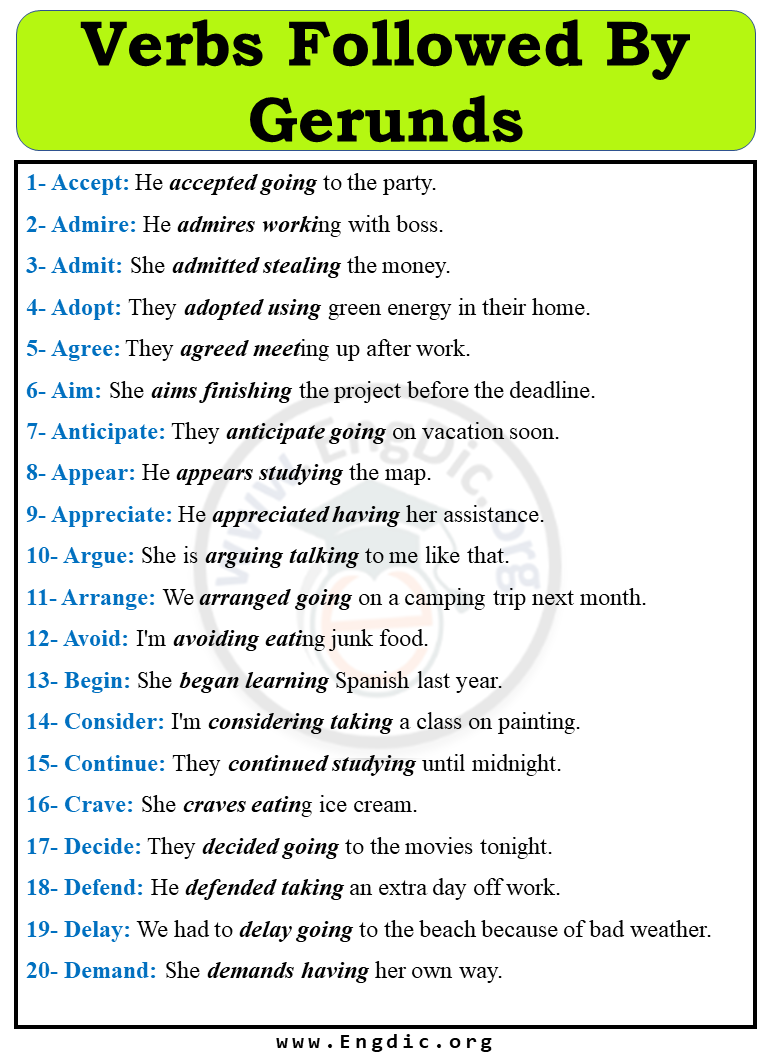
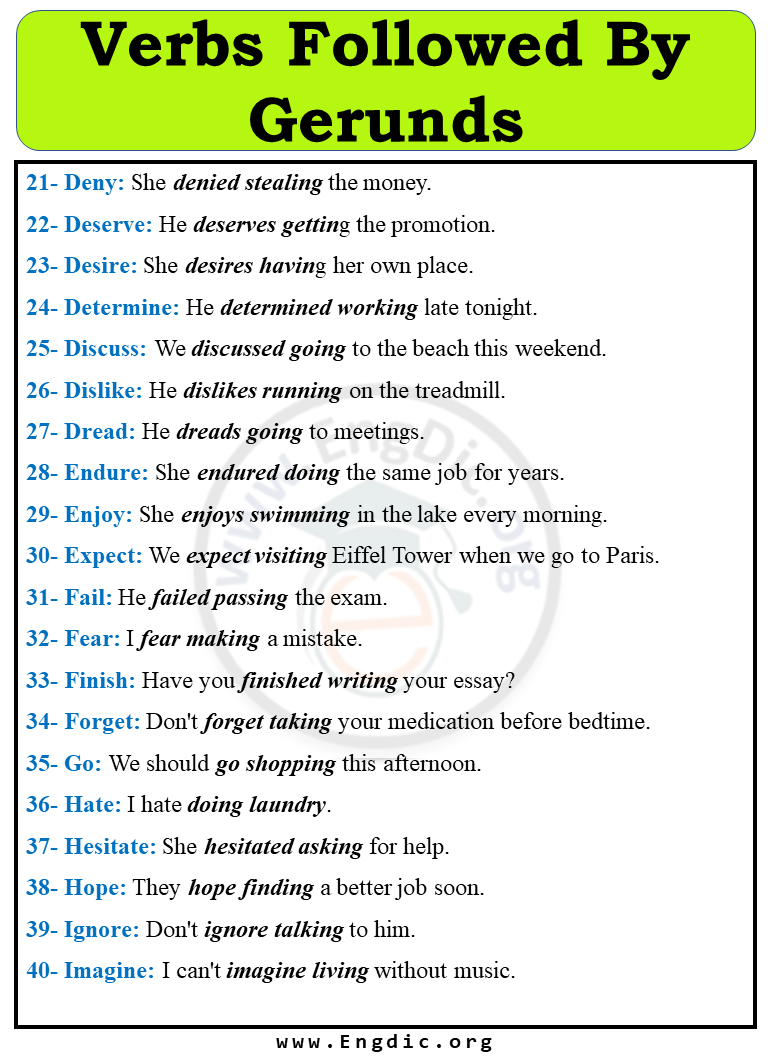
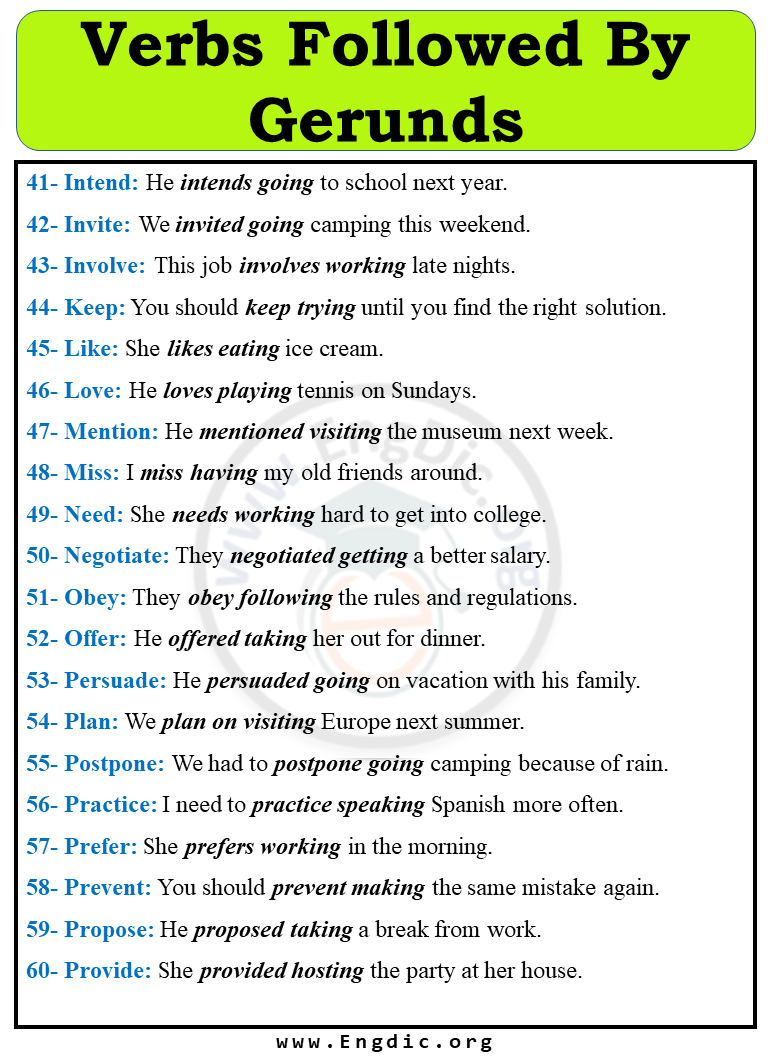
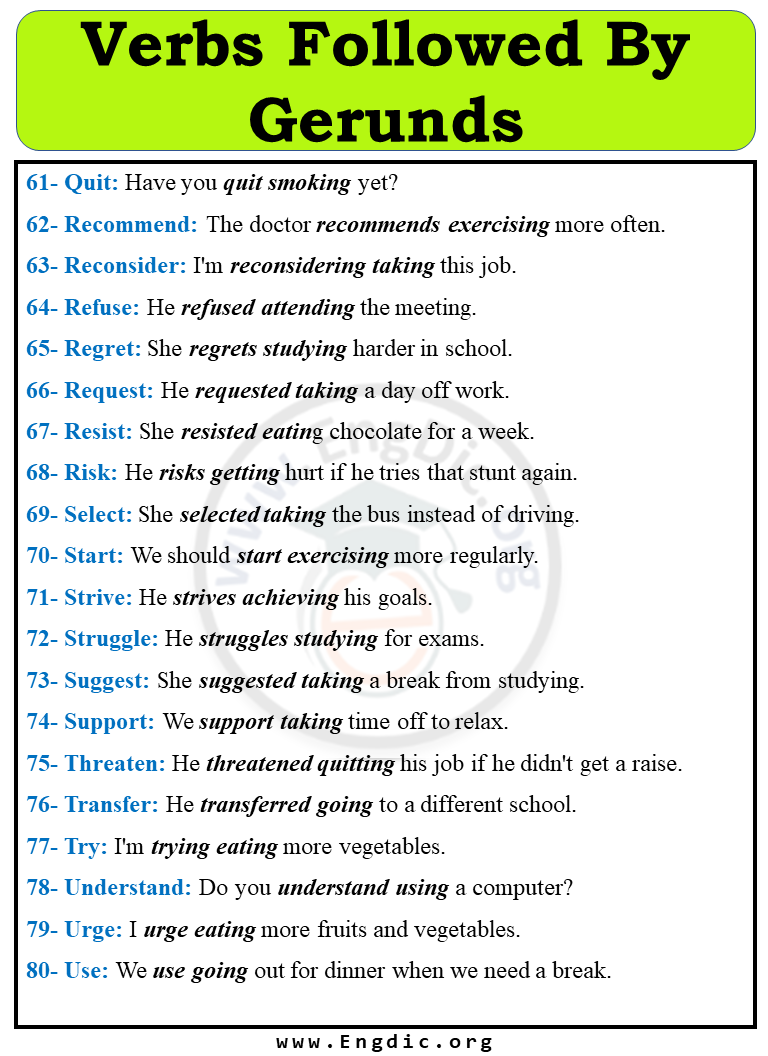
List of Gerunds (A to Z)
Here is the list of all important A to Z Gerunds;
1- Accepting
2- Accomplishing
3- Accounting
4- Achiving
5- Acting
6- Adding
7- Admiring
8- Advising
9- Affording
10- Allowing
11- Announcing
12- Answering
13- Apologizing
14- Appearing
15- Appreciating
16- Approaching
17- Arranging
18- Asking
19- Attaching
20- Attending
21- Avoiding
22- Backing
23- Balancing
24- Bargaining
25- Bashing
26- Battling
27- Becoming
28- Beginning
29- Behaving
30- Believing
31- Blaming
32- Blessing
33- Boasting
34- Booking
35- Breathing
36- Calling
37- Carrying
38- Catching
39- Challenging
40- Changing
41- Checking
42- Choking
43- Choosing
44- Claiming
45- Closing
46- Collecting
47- Comforting
48- Communicating
49- Comparing
50- Complaining
51- Completing
52- Concentrating
53- Considering
54- Consisting
55- Consuming
56- Containing
57- Continuing
58- Copying
59- Correcting
60- Costing
61- Counting
62- Covering
63- Cracking
64- Creating
65- Crossing
66- Crying
67- Curling
68- Cutting
69- Deciding
70- Declaring
71- Decorating
72- Delivering
73- Demanding
74- Describing
75- Designing
76- Destroying
77- Developing
78- Disappearing
79- Discovering
80- Discussing
81- Disobeying
82- Doing
83- Doubting
84- Drawing
85- Dreaming
86- Drinking
87- Driving
88- Eating
89- Enjoying
90- Entertaining
91- Escaping
92- Examining
93- Existing
94- Expecting
95- Explaining
96- Exploring
97- Expressing
98- Farming
99- Fetching
100- Fighting
101- Filling
102- Finding
103- Finishing
104- Following
105- Forbidding
106- Forgiving
107- Forming
108- Founding
109- Gaining
110- Gathering
111- Getting
112- Giving
113- Going
114- Greeting
115- Growing
116- Guessing
117- Handling
118- Hanging
119- Happening
120- Helping
121- Hiding
122- Holding
123- Hoping
124- Hurting
125- Identifying
126- Imagining
127- Importing
128- Including
129- Increasing
130- Informing
131- Inserting
132- Inspiring
133- Instructing
134- Inviting
135- Joining
136- Keeping
137- Kicking
138- Killing
139- Knowing
140- Lasting
141- Laughing
142- Leading
143- Listening
144- Living
145- Locking
146- Looking
147- Loving
148- Managing
149- Marrying
150- Matching
151- Measuring
152- Meeting
153- Memorizing
154- Mentioning
155- Mixing
156- Moving
157- Naming
158- Needing
159- Noticing
160- Obtaining
161- Occuring
162- Offering
163- Operating
164- Ordering
165- Organizing
166- Originating
167- Overcoming
168- Paying
169- Performing
170- Planning
171- Playing
172- Pointing
173- Possessing
174- Posting
175- Practising
176- Preaching
177- Picking
178- Placing
179- Planting
180- Pointing
181- Presenting
182- Preserving
183- Pretending
184- Preventing
185- Producing
186- Promising
187- Protecting
188- Providing
189- Pulling
190- Pushing
191- Questioning
192- Reaching
193- Reacting
194- Reading
195- Realizing
196- Receiving
197- Recognizing
198- Recommending
199- Recording
200- Recovering
201- Refusing
202- Regretting
203- Rejecting
204- Rejoicing
205- Remaining
206- Remembering
207- Repeating
208- Replacing
209- Reporting
210- Representing
211- Requesting
212- Rescuing
213- Researching
214- Responding
215- Resting
216- Retaining
217- Returning
218- Ruling
219- Running
220- Screaming
221- Searching
222- Seeing
223- Selling
224- Serving
225- Setting
226- Shaking
227- Sharing
228- Showing
229- Singing
230- Smiling
231- Solving
232- Speaking
233- Splitting
234- Spreading
235- Starting
236- Staying
237- Stepping
238- Stopping
239- Struggling
240- Suggesting
241- Supplying
242- Supporting
243- Suspecting
244- Taking
245- Teaching
246- Telling
247- Testing
248- Thinking
249- Throwing
250- Touching
251- Training
252- Travelling
253- Treating
254- Trusting
255- Trying
256- Turning
257- Using
258- Visiting
259- Waiting
260- Waking
261- Walking
262- Wanting
263- Warning
264- Watching
265- Weeping
266- Winning
267- Wishing
268- Working
269- Worrying
270- Writing
271- Yelling
272- Zipping
273- Zooming

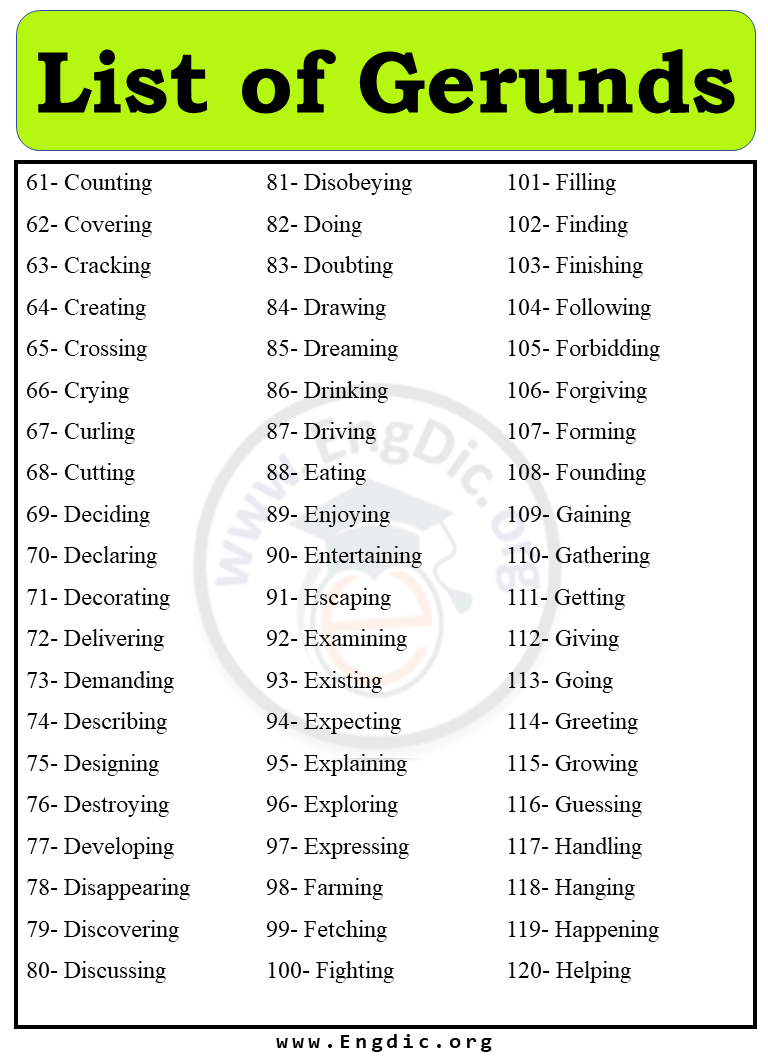

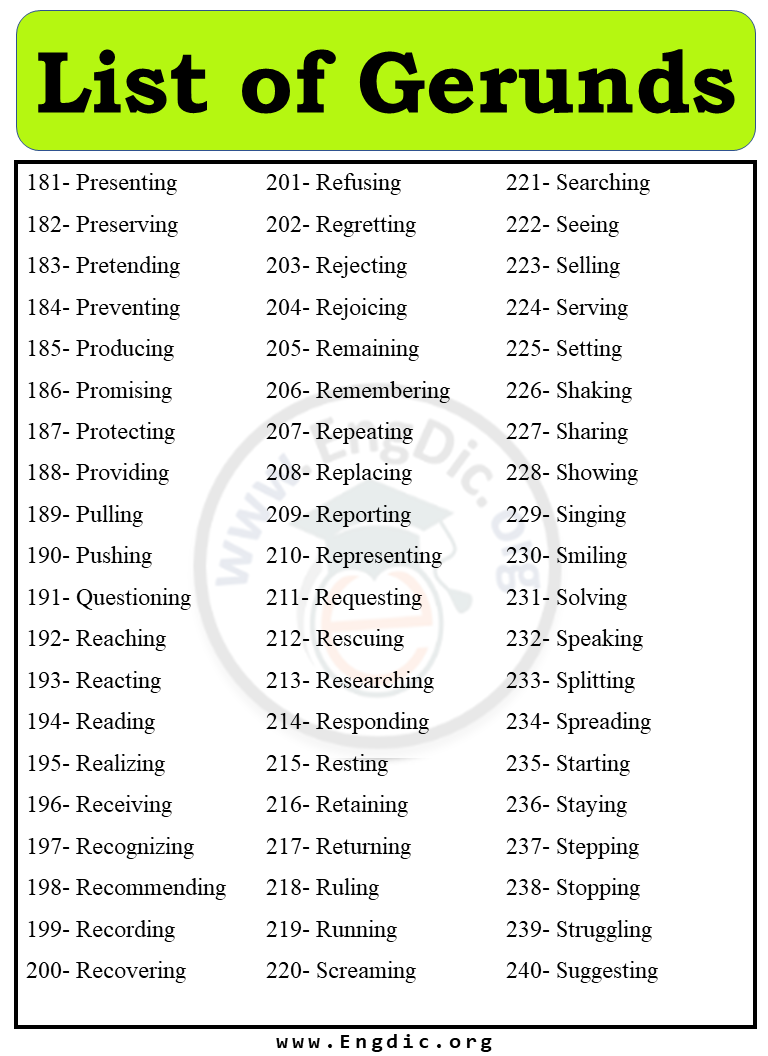
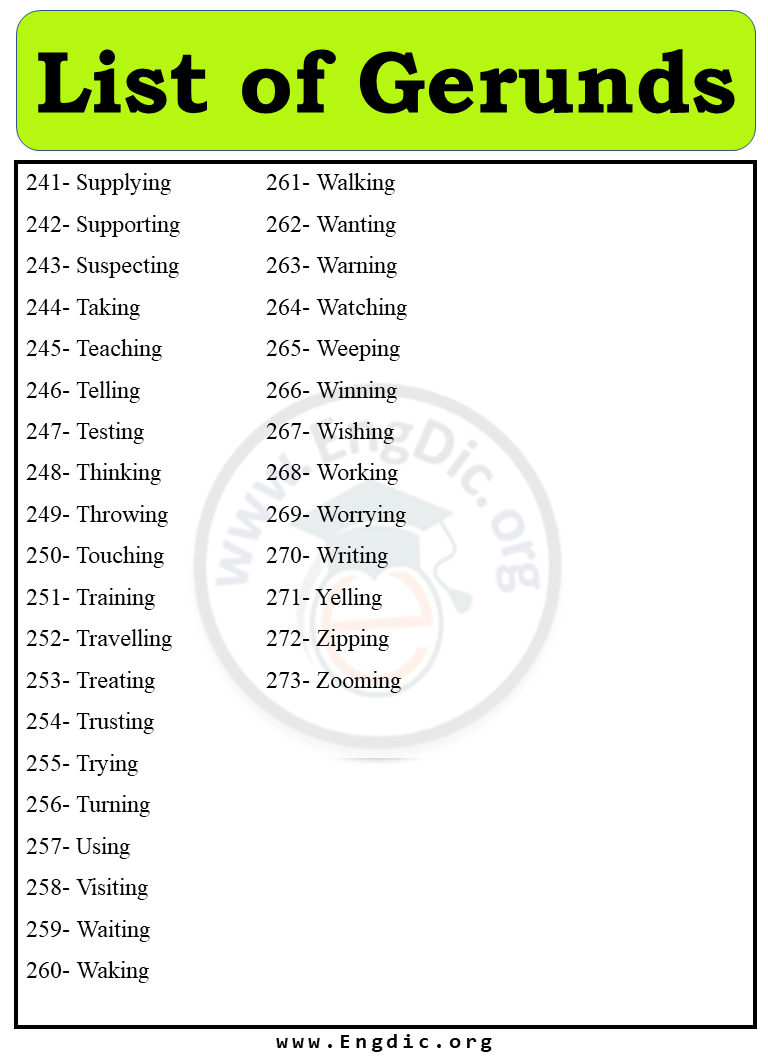
DOWNLOAD PDF BOOK of a comprehensive lesson on gerunds.
Discover More:
A – B – C – D – E – F – G – H – I – J – K – L – M – N – O – P – Q – R – S – T – U – V – W – X – Y – Z


